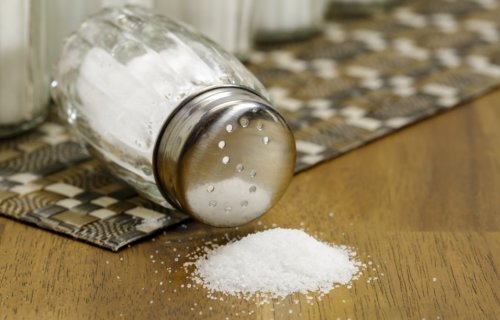ATLANTA — A low-sodium diet may help people avoid heart disease. Unfortunately, nearly everyone is consuming way too much salt. Researchers have found that nine in 10 patients with heart disease consume more than twice as much salt than health guidelines recommend.
The U.S. Department of Agriculture recommends that healthy people limit themselves to 2,300 mg/day — about one teaspoon of table salt daily. For people battling heart disease, the guidelines are even stricter. The U.S. Dietary Guidelines suggest that patients consume no more than 1,500 mg/day.
Despite this, the new study discovered that the vast majority of Americans are going over this limit of salt on a daily basis. In fact, the study of 3,100 people with heart disease revealed that 89% surpassed 1,500 mg of salt each day. Overall, the average participant with cardiovascular disease reported consuming 3,096 mg of sodium per day. This is slightly less than what the national average for daily salt intake is — currently sitting at a whopping 3,400 mg/day according to the U.S. Centers for Disease Control and Prevention.
“Estimating sodium quantities in a meal can be challenging,” says Elsie Kodjoe, MD, MPH, an internal medicine resident at Piedmont Athens Regional Hospital in Athens, Georgia and the study’s lead author, in a media release. “Food labels aid in dietary sodium estimation by providing sodium quantities in packaged food. Yet, adhering to a low sodium diet remains challenging even for individuals with cardiovascular disease who have a strong incentive to adhere.”
Why is limiting salt so important for heart health?
Sodium is actually an essential nutrient that’s part of a balanced and healthy diet. As StudyFinds dietitian Shyla Cadogan explains, salt is not “bad,” it’s a requirement for proper muscle contractility and relaxation, fluid and mineral balance, and appropriate nerve signaling. The problems start when people use too much of this tasty seasoning.
Kodjoe and the team note that consuming too much salt raises blood pressure, which can damage blood vessels and forces the heart to work harder. Consuming too much salt can also cause the body to retain excess fluid, making conditions like heart failure even worse.

“The relatively small difference in sodium intake suggests that people with cardiovascular disease are not limiting their intake very much compared with the general population and are also consuming more than double what is recommended,” Kodjoe adds. “To make it easier for patients to adhere to dietary guidelines, we need to find more practical ways for the general public to estimate dietary sodium levels or perhaps consider a reduction in the sodium content of the food we consume right from the source.”
Everyone is consuming way too much salt
The study compared sodium intake among a diverse group of people dealing with cardiovascular disease. All of them have been diagnosed with a heart attack, stroke, heart failure, coronary artery disease, or angina in the past. Even after looking at specific factors, including age, sex, race, and educational history, there were no significant differences in the amount of salt people were consuming each day. Simply put, the vast majority of people are consuming too much salt, regardless of their background.
So, what can the public do to avoid salt? Researchers recommend cooking more meals at home. This gives people more control over the amount of seasonings they use in their food. It can also help to pay closer attention to food labels while shopping. The benchmark for sodium in foods should be 140 mg or less per serving.
“Cardiovascular disease is real, and it is the number one cause of morbidity and mortality worldwide according to the World Health Organization,” Kodjoe concludes. “Adhering to sodium guidelines is one of the easier strategies individuals could readily adopt to reduce hospitalizations, health care costs, morbidity and mortality associated with cardiovascular disease.”
Researchers are presenting their findings at the American College of Cardiology’s Annual Scientific Session.
